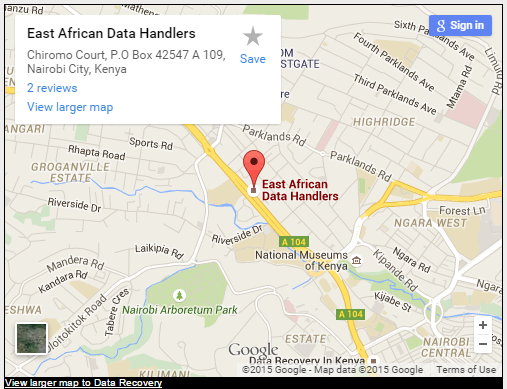Data Disaster Recovery Plan
Did you know that no organization looks forward to the day they implement their Data Disaster Recovery Plan. But like any good insurance policy, Data Disaster Recovery Plan is an essential component of business continuity and preservation.
Am sure most people understand that much or have an idea. Where organizations often fall short, however, is the details and preparation. The only thing worse than having no plan at all is not going through the proper research and review prior to the event that takes you offline.
Point of advice , don’t find yourself stuck like the character ” Kamau” as illustrated in the image. Get your facts right! and start the process now while keeping in mind these six, baseline items:
1 – Identify and plan for your most critical assets.
Because of the high resource requirements of a good Data Disaster Recovery Plan, focus only on the processes and applications that are most crucial to your business while you restore normal operations. For many companies, those may be customer-facing applications and systems like e-commerce sites or portals. Applications like email, while important, may take a secondary position, and systems for internal use only – like HR or accounting applications – may fill out a third tier.
2 – Determine RPO/RTO.
The Recovery Point Objective (RPO) is the maximum amount of time your business can tolerate between data backups. If your RPO is one day, that means you can survive losing one day’s worth of data, but no more. Your Recovery Time Objective (RTO), on the other hand, is the target for restoring regular service after the disaster strikes. Neither metric is arbitrary, and you’ll likely have to crunch a lot of numbers and coordinate with virtually every business unit to determine the most accurate objectives.
3 – Scope out the technical mechanics.
The hybrid era of IT, for all its benefits, only makes Data Disaster Recovery Plan planning more difficult. Critical business processes and applications exist in a complex web of interdependencies. You’ll have to map relationships across server, storage and network infrastructure and develop accurate scripts to ensure apps function like they’re supposed to in the recovery environment.
4 – Select an appropriate failover site.
Traditional Data Disaster Recovery Plan requires redundant infrastructure in which to failover. Not only is this pricey, you have to choose a site that makes sense geographically (i.e. – low odds of being affected by same event) and offers an SLA that’s up to your current standards.
5 – Take advantage of the cloud.
For many organizations, designing a robust Data Disaster Recovery Plan is significantly impeded due to extremely high cost and resource requirements. Data Disaster Recovery Plan as a Service (DRaaS), however, is a cloud-based solution that eliminates the heavy capital expense, putting Disaster Recovery within reach of companies unable to acquire the redundant infrastructure needed to restore service. EADH offers a comprehensive DRaaS solution for hosted private cloud customers that includes seamless failover and failback, an RPO within seconds, and an RTO within minutes.
6 – Document, Test, Refine.
This is the hat trick of ensuring effective execution. Each of these components is critical. Your plan needs to be specific and detailed. Plans, procedures, responsibilities and check lists should be clearly documented. You want your team to have clear marching orders and leave little to interpretation in the middle of a crisis.
Call us now and dont be a victim of disaster like Kamau and you are hit when least expecting with a huge cost waiting for you only if he had a Data Disaster Recovery Plan.
If you’ve lost valuable, irreplaceable data or need Data Recovery Plan for your Oraganisation or business— We can save it! Call us now at +254 711 051 000 or visit our offices Chiromo Court 3rd Floor Westlands, Kenya. Best of it, we have distributed offices all over East Africa and can easily get your device brought to us from anywhere in East Africa.
Also we have other services in data recovery for various devices; Hard Drives, Laptops, Desktops, Raid Systems, RAID / NAS / SAN , Servers, Memory Cards, Flash Drives, Databases, SSD Drives etc
East African Data Handlers ltd no data – no charge policy means you owe us nothing if we are unable to recover your critical files.














